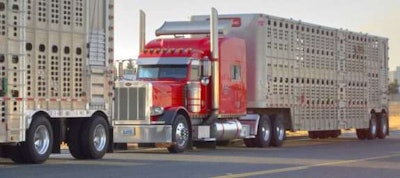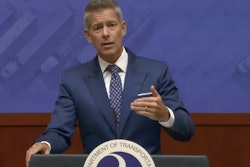
A bipartisan bill introduced in the House earlier this week and backed by one of the trucking industry’s leading trade associations would if signed into law, reform some hours of service regulations. It also would allow the Federal Motor Carrier Safety Administration to move more quickly on any rulemaking meant to provide drivers with split sleeper berth flexibility pare down the number of supporting documents drivers are required to maintain under the electronic logging device mandate.
The Honest Operators Undertake Road Safety Act (HOURS Act, H.R. 6178) was introduced June 21 by Reps. Rick Crawford (R-Arkansas), Sanford Bishop (D-Georgia) and Bruce Westerman (R-Arkansas).
The American Trucking Associations Thursday announced its support for the legislation.
“Now that the trucking industry is coming into full compliance with the electronic logging mandate, the next step in improving truck safety and supply chain efficiency is to use the data these ELDs collect to make needed improvements to the underlying hours-of-service rules,” said ATA President and CEO Chris Spear.
Like other hours reform bills introduced in recent weeks, the bill includes changes specific to the livestock and agriculture sector. The HOURS Act would allow drivers hauling livestock and ag commodities to be exempt from hours of service limits and duty status records year round if operating within a 150 air-mile radius of the source of their livestock or ag product, rather than only during state-designated harvesting and planting seasons.
The act also would cut the number of documents drivers must have to verify the accuracy of their electronic logs. Current regulations require drivers to maintain at least eight supporting documents for their 24-hour work period, such as fuel receipts, bills of lading and dispatch records. The HOURS Act would cut that to just two documents — one to verify the start of their workday and one to verify the end.
The bill would allow FMCSA to skip a step in the formal rulemaking process should the agency pursue a rule to allow drivers to split their off-duty sleeper berth time into segments. Current regulations only allow drivers to split their sleeper berth time into segments of 8 hours and 2 hours, for the required 10-hour off-duty period every 24 hours. But FMCSAbis studying the feasibility of allowing more flexible split sleeper options, such as 7-3, 6-4 and 5-5.
If the agency pursues a rule to alter split sleeper time, the HOURS Act would allow FMCSA to skip the advanced notice of proposed rulemaking stage and move directly to proposing the rule and accepting public comments.
Lastly, the HOURS Act would create a unified set of hours rules for short-haul drivers. It would allow drivers operating within 150 air-miles of their work reporting location to be exempt from hours regs and the ELD mandate if they complete their work day within a 14-hour period. Current regs only allow this for non-CDL drivers operating under the short-haul exemption.







